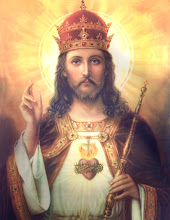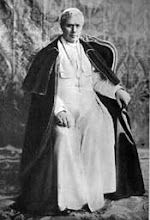Me he tomado la libertad de retitular este post no original nuestro sino de Monseñor Williamson, quien lo tituló en su bitácora como “Colonial Charm”. Queda claro a lo largo del texto que lo que Portugal –y España- hicieron a lo largo de la historia va más allá de un cierto “encanto colonial”. Las naciones hispánicas no forjamos colonias, sino Imperios donde la subsidiariedad y las libertades (en plural) imperaban. Y nuestra decadencia, nuestro desastre, está en habernos infectados de ideas contrarias a la Catolicidad –e incluso a la Roma clásica- y acabar haciendo colonias de lo que fue parte consustancial nuestra.
De los franceses, a los que Su Ilustrísima incluye con los ibéricos, mejor no hablar … Ellos sí que fueron coloniales, aunque tuvieran cierto respeto con la religión católica. Más que los ingleses, claro. ¿Qué otra cosa podía y puede hacer el Quinto Imperio anglosajón sino servir al Enemigo?
Fuera de estas dos precisiones, suscribo enteramente el artículo. Está claro que a Monseñor Williamson su estancia argentina le ha hecho un gran bien. También yo tengo nostalgia de esos Portugales que en el mundo son.
El texto original está aquí.
Rafael Castela Santos
«A brief visit to Goa, former Portuguese colony half-way down the western coast of the Indian sub-continent and now a full member-state of the Republic of India, revives within me a great nostalgia, a great debate and always the same great conclusion: the Lord God is not a little lap-dog to be put on a leash!
The -square mile enclave of Goa was conquered by the Portuguese in two stages, in 1510 and 1546, as an essential link in a chain of supply-stations for their ships travelling between Europe and the Far East for the spice trade, which then brought with it immense wealth. The conquest still shows in a ring of well-designed and well-built forts surrounding the Old City of Goa, and largely visible today. The wealth still shows in a few sumptuous churches of the Old City, dating back to the early years of the Portuguese settlers when the spice trade and their Catholic Faith were in their hey-day. Goa was the base of operations in the Far East for St. Francis Xavier, whose body rests in one of the great churches. Goa is where he wanted to be buried. He still watches over it.
From the 18th century onwards Goa lost its importance for trade, but the Portuguese remained, because they had put down deep roots and had created what some have called the “Rome of the Orient”. They had successfully converted the local population, even at one point destroying all Hindu temples. The result was a Catholic enclave in the warmth of the tropics, peaceful and happy, with an administrative order typical of the colonies prior to their de-colonisation, and with a special charm of which traces remain to this day. Hence the nostalgia.
But time moves on. By mid-20th century the adoration of “liberty” and the onward march of “independence” were spelling the death of the European colonies and empires. At least in the Portuguese, Spanish and French empires the conquest of souls for Heaven had been a driving motivation, evident in Goa, but now failing in Rome of the Occident itself, preparing its Revolutionary Vatican Council. Where God the Father was being stripped of His Fatherhood, any kind of paternity or paternalism was being correspondingly outlawed, and that included all paternalism of colonies and empires. “Colonialism” and “imperialism” were to be replaced by scruffy tourism and disordered socialism. Religion, or irreligion, rules.
So in 1961 the combined army, air force and navy of the new Indian Republic took over the enclave of Goa. Hinduisation is proceeding apace, Goa has been moved into the modern world, and Hindu temples are being built everywhere, with the encouragement of the Catholic priests. But is it the fault of the children or the fathers? Was not a mosque built recently right next to St. Peter’s in Rome ? Kyrie eleison.»
Monseñor Ricardo Williamson, Goa (23 de Agosto, 2008)
(RCS)
sexta-feira, agosto 29, 2008
Goa, Portugal and a Catholic insightful perspective
Publicada por
Rafael Castela Santos
à(s)
sexta-feira, agosto 29, 2008

Enviar a mensagem por emailDê a sua opinião!Partilhar no XPartilhar no FacebookPartilhar no Pinterest
Subscrever:
Enviar feedback (Atom)
















0 comentários:
Enviar um comentário